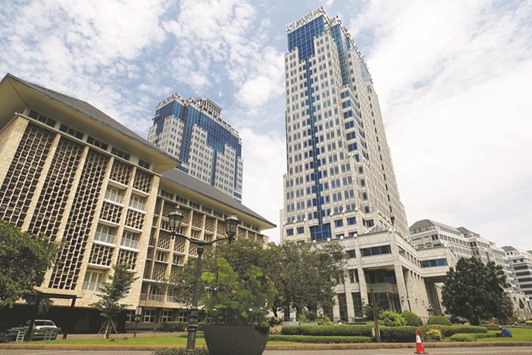A global hunt for yields is spurring the longest Indonesian bond rally in more than two years even as the government plans record debt sales.
A gauge of rupiah-denominated sovereign securities climbed for 16 days through Monday and the notes have returned 16% this year, the most in Asia, Bloomberg indexes show.
Overseas ownership stands at an all-time high as investors fleeing negative yields in Europe and Japan snapped up local 10-year bonds offering more than 7%.
Indonesian debt has attracted $6.7bn of inflows in 2016 as President Joko Widodo boosts infrastructure spending, and as low inflation and a stronger currency give the central bank room to add to four interest-rate cuts this year. Rupiah notes are more attractive than other emerging Asian securities due to their higher yields, the government’s tax amnesty and progress in restructuring Southeast Asia’s largest economy, according to Mitsubishi UFJ Kokusai Asset Management Co.
“The strong return in Indonesia owes to expectations of further rate cuts given that inflation is behaving itself,” said Edwin Gutierrez, the London-based head of emerging-market sovereign debt at Aberdeen Asset Management, which oversees $420bn.
Changes to Indonesian taxation rules are also buoying bond prices, Gutierrez said. Bank Indonesia estimates the tax amnesty programme, started in July to lure home undeclared earnings, will result in 560tn rupiah ($42.8bn) of inflows and boost 2016 economic growth to 5.33% from 5.03%.
In the past year, Widodo also effectively scrapped a withholding tax on the nation’s global bonds, accelerated approval of business permits and cut energy prices and electricity tariffs for the industrial sector.
Indonesian 10-year yields have fallen about 50 basis points in the past month, compared with declines of 28 basis points for comparable Malaysian securities and 16 basis points for Thailand’s debt. At 7.13%, they are still the highest in Southeast Asia, burnishing their appeal at a time when almost $10tn of bonds worldwide have negative yields. Morgan Stanley predicts 10-year US yields will fall to 1% in the first quarter of 2017 from 1.56% yesterday as the global environment remains supportive of bonds.
Overseas holdings of Indonesian sovereign debt climbed to a record 651.4tn rupiah on July 15 as an uncertain global outlook following the UK’s vote to leave the European Union and reduced bets for a US interest-rate increase this year spurred demand for safer assets. Widodo’s efforts to push through economic reforms and accelerate spending on roads, ports and power plants also boosted confidence.
“The trend for declining yields will continue until the 10-year yield reaches 6.5%, or even 6%,” said Dwianto Oktory, portfolio manager at PT Indo Premier Investment Management, which oversees 3.5tn rupiah of assets.
“Bonds will get a huge boost from the tax amnesty, along with stocks, as the fastest way to park repatriated funds from the programme is still through financial instruments.”
The rupiah has strengthened 5.4% against the dollar this year and technical indicators show it may appreciate another 7%, according to Gregg Tan, a charting specialist at Bloomberg. The Jakarta Stock Exchange Composite Index has surged 13% in 2016, following a 12% drop in the previous year.
Indonesia’s government raised its net annual bond sale target last month by 37.6tn rupiah to an unprecedented 364.9tn rupiah as part of a revised budget for 2016.
“Demand for emerging-market bonds is extremely strong, and Bank Indonesia’s rate cuts have ultimately made it cheaper to borrow,” said Dwyfor Evans, a macro strategist at State Street Global Markets in Hong Kong. “The extra supply doesn’t change a broadly positive picture. There’s sufficient external demand for additional paper.”
Widodo’s administration is turning to fiscal measures after interest-rate cuts since January failed to counter the impact of slowing global demand. Indonesian exports contracted for 21 months through June, and gross domestic product growth of 4.92% in the first quarter fell short of the 5.07% forecast in a Bloomberg survey.
“With the hunt for yield still strong, Indonesian government bonds are still attractive and should hold up relatively well even through a Fed hike cycle,” said Eugene Leow, a Singapore-based fixed-income strategist at DBS Bank Ltd “We don’t think the negative impact from a larger issuance will dent demand for Indonesian government bonds.”

A general view of Bank Indonesia’s headquarters in Jakarta. Changes to Indonesian taxation rules are buoying bond prices. Bank Indonesia estimates the tax amnesty programme will result in $42.8bn of inflows and boost 2016 economic growth to 5.33% from 5.03%.
